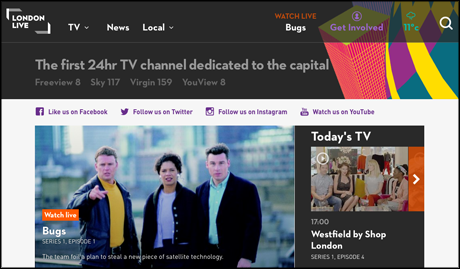
It has been two years since the first in a new range of local television licences was awarded for parts of the UK. Since then, six channels have made it on-air, 23 are preparing to launch and one has gone bust.
Journalism academics who see potential in the new medium have formed partnerships with broadcasters, in a move which could create work experience and job opportunities for students and graduates.
But critics of the new project still have doubts about its commercial sustainability, and whether the new channels will do enough to embrace digital innovation.
Even the media regulator Ofcom acknowledges that "the nature of awarding licences for a new type of service in a competitive media market means that it is very unlikely that all channels will succeed".
Job opportunities
Many of the channels to have been licensed so far are built around cross-media partnerships and consortia including broadcasters, newspapers, community groups and universities and colleges.
KMTV, which is due to launch in Maidstone, is a partnership between KM Group and the Kent University journalism department. STV Glasgow, which went on-air in June, also works closely with the local university.
Julian Calvert, a senior lecturer in journalism at Glasgow Caledonian University, says the growth of local TV presents an exciting opportunity for students and graduates.It's a very secure place for our students to be involvedJulian Calvert, Glasgow Caledonian University
He says: "It (provides) opportunities for our students – most obviously work experience opportunities. Also, it gives students the opportunity to pitch ideas directly to senior people at STV. They're a new channel and they're very much looking for new ideas. Three or four of the producers on the new channel are our graduates.
"I don't think any of the other rival bids [for the licence] had that [academic] element to it. It shows that there's an element of wider engagement not just with the education community, but engaging with community groups who haven't always had an obvious voice in news.
"It's a very secure place for our students to be involved, in terms of finance. It's doing very well commercially compared to some of the projects elsewhere."
The need to innovate
Local television also provides a new opportunity to innovate and experiment with cross-media publishing. Luke Gaydon, vice-president of media (EMEA) at online video provider Brightcove, says it is important that the newly licensed stations do not focus purely on TV.
He told Journalism.co.uk: "We've seen a few of our customers launch local services. There is absolutely an opportunity for this type of localised content and there is a demand for it, but the way that the content is presented and communicated to audiences is something that's quite nuanced and you've got to get that right.Is there a sound business case behind it? It's not quite all perfect yetLuke Gaydon, Brightcove
"I don't think it should be a question of saying 'we are a local television broadcaster'. It's more 'we are an aggregator and distributor of local news in whatever format makes the most sense'.
"What we've seen over the last few years is the barriers to entry in terms of costs and technical complexity are a lot lower. I think there's still work to do on the return on investment, is there a sound business case behind it? It's not quite all perfect yet."
The launch of local television in the UK so far has not been without its problems. City TV in Birmingham went into administration before it could launch - with rivals set a November deadline by Ofcom to come forward and take over the licence.
Meanwhile, London Live - in partnership with the Evening Standard - has tried to renegotiate the terms of its licence, with a renewed focus on current affairs, and asked Ofcom to reduce the number of hours of local content it is required to air. The regulator turned this down.
Anthony Rose, co-founder and president of social television platform Beamly, questions Ofcom's role in the development of local TV.You never set up a website so the only people who can see it in the world are in your townAnthony Rose, Beamly
He says: "I think the regulator misunderstood what local means in the context of global personalised online experiences. The regulator sought to use broadcast TV as a means of delivering a substantial audience for a local proposition.
"But the signal is only available in that area, which is quite unlike a hyperlocal website. You never set up a website so the only people who can see it in the world are in your town. Any time you're making halfway decent content, it's like that some fraction [of the rest of the UK or world] will be interested and it should be findable.
"If you see the broadcast channel as merely being another distribution vehicle, and you're thinking about web-first, that's fine."
He adds: "With London Live, I share their excitement that by linking it with offline media – a newspaper – London is such a vast source of things, if London Live can't make it, nobody else can. People are always interested in local things from traffic to crime to restaurants to films. But you get all that inside a global property – you go to a website to get a combination of local and global things."

Screenshot from LondonLive.co.uk
Reinventing traditional TV?
So what is the solution? Rose adds: "I think where the opportunity lies particularly for a large region is to reinvent the channel concept.
"You could have an entirely new form of TV channel that combines television with the second-screen application, with quizzes, with participatory call-ins with Skype. It's a new type of television experience for a digital age. For me that would be a great solution that comes up with something innovative."
A second phase of local TV licensing is already under way and Ofcom says there is continued interest from potential applicants in launching channels across the UK. The regulator is seeking applications for new local TV channels in seven areas - Aberdeen, Ayr, Carlisle, Dundee, Forth Valley, Inverness and Stoke on Trent.
Ofcom's licensing team and management from KMTV, Notts TV, Mustard, Estuary TV, Bay TV, London Live and the former management of City TV Birmingham were unavailable for comment.
Local TV – the challenges and opportunities – is the subject of this week's Journalism.co.uk podcast.
Free daily newsletter
If you like our news and feature articles, you can sign up to receive our free daily (Mon-Fri) email newsletter (mobile friendly).









